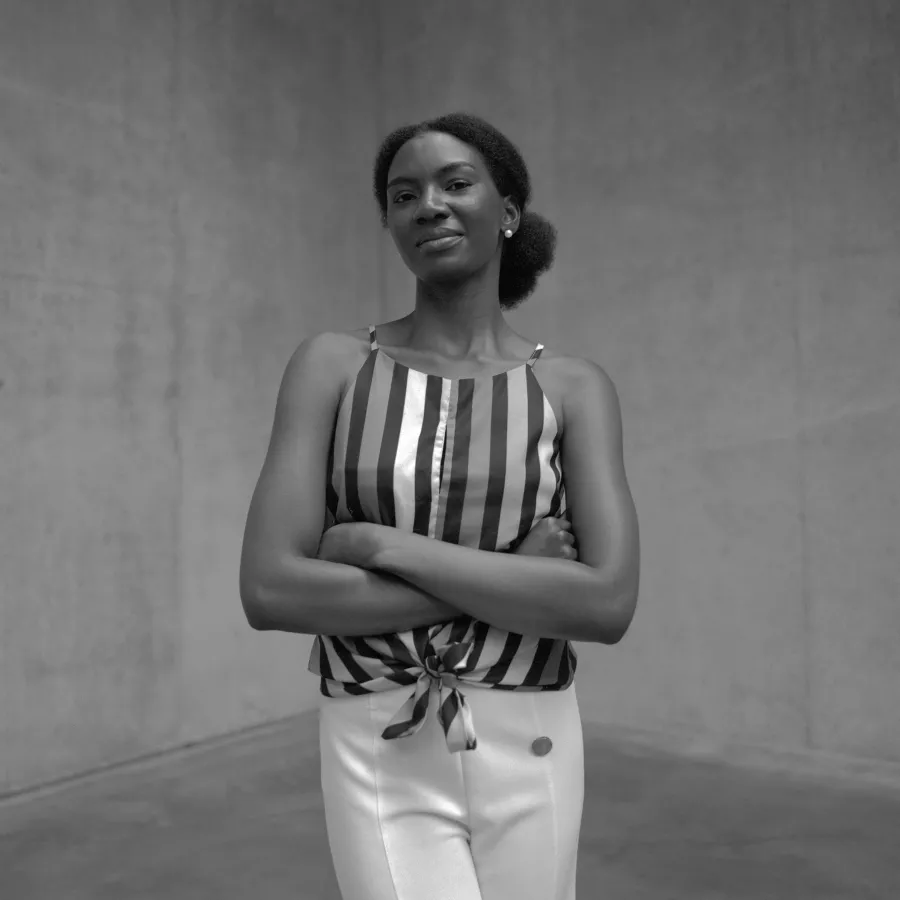The Education of Aminatu Abdulai
Alum News
This Ada Comstock Scholar is transforming her home village in Ghana by building a school, creating new opportunities for the next generation.
Photograph by Valerie Chiang
Published July 17, 2024
The village of Kolinvai is located in the northeast section of the Republic of Ghana in West Africa. There is no official population count, but about 300 homes dot the landscape, each shared by large extended families, some with as many as 50 relatives under one roof. There are no paved roads or running water. Most villagers are farmers and don’t consider formal education crucial to their way of life. Children are expected to work on the farms and join their parents for long hours toiling in the fields. Women have limited options: marrying, raising families, housekeeping, tending crops.
For Aminatu Abdulai AC ’23, a native of Kolinvai, all that changed in 2005, when a group from a nongovernmental organization arrived in the village and implement- ed a program that allowed children to fit lessons in with their farm work and chores. At first, Abdulai’s parents objected to allowing their young daughter to participate, but Abdulai pleaded until they gave in. Finally, at age 10, she was a student—and, for the first time in her life, a wider world full of possibilities opened up to her. “I did nine months of reading and writing in my own language, and then I did three months of English,” she recalls. “In those three months, I realized I didn’t have to go to the farm, which I hated. I could learn this different language and make something of myself.”
This revelation would ultimately change the course of Abdulai’s life, propelling her more than 5,000 miles away from home to pursue her dream of working in medicine and fueling a passion for education that has inspired her to give back to the village in one of the most profound ways possible: by leading an effort to build a fully equipped junior high school so that children in Kolinvai won’t have to struggle like she did to receive an education.
The junior high school was so unsafe that lessons often had to be canceled for fear that the building would collapse in heavy rains or high winds.
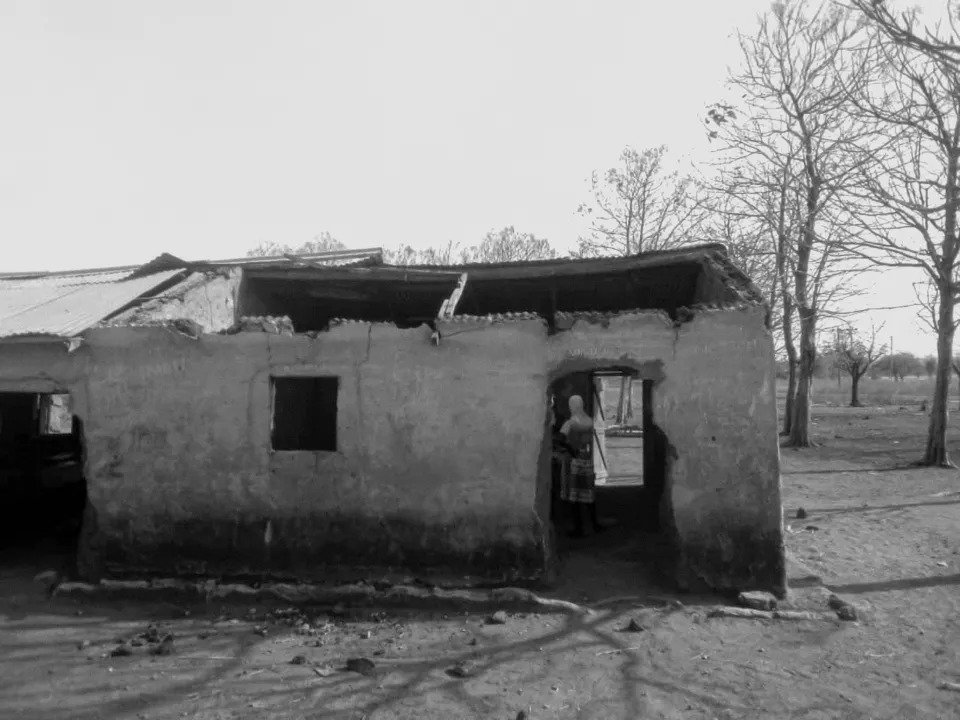
In 2022, Abdulai came home to find her village's two schools on the verge of crumbling.
Abdulai’s friends and colleagues see her rise as a reflection of her innate desire to improve the lives of those around her. “I am so proud of Aminatu,” says Asmae Lichir AC ’24, who lived with Abdulai in Conway House at Smith. “I thank her for giving others the opportunity to make them proud of themselves because every child who will go to that school will feel empowered in those walls. She will change the lives of every child in that community. She inspires me because I’m someone who comes from Africa; I wish to be Aminatu—and I’m saying this with tears.”
IN 2022, WHILE A STUDENT AT SMITH, Abdulai was planning to return home for a visit. Not wanting to arrive empty-handed—and understanding her village’s urgent need for the most basic supplies—she organized a small fundraiser that netted about $1,500, which she used to buy pens, books, rice, and other items to distribute to the children there. “So much was given to me when I came to Smith,” she says. “I wanted to do that for other people.”
Once back home, Abdulai was pleased to see that Kolinvai now had electricity, but the village’s two schools were on the verge of crumbling. Though the elementary school was salvageable, the junior high school was beyond repair. (There has never been a high school in Kolinvai.) It was so unsafe that lessons often had to be canceled for fear that the building would collapse in heavy rains or high winds. “Seeing that the children were facing the same challenges I once did broke my heart,” she says. She wanted to do something for her community sooner rather than later. But what? During her final year at Smith, she landed on an answer: She would build a school.
Abdulai turned to Smith’s Jill Ker Conway Innovation and Entrepreneurship Center for help. There, Andrea St. Louis, the center’s director, worked with her to develop an entrepreneurial plan and fundraising ideas. When she didn’t win the center’s elevator pitch contest, Abdulai refined her goals.Wanting to ensure that the new school would be suitably maintained through the years, she established the Kolinvai Youth Foundation, with a mission to provide a safe learning environment for the children of the village and surrounding communities. She also set up a GoFundMe campaign and applied for several grants. A $10,000 grant from the 2023 Davis Projects for Peace initiative was followed by a $23,000 Ada Comstock Magic Grant. As she closed in on her fundraising goal, Abdulai remembers thinking, “Oh my god, we’re going to do this project.” The school that had existed only in her imagination was quickly becoming a reality.
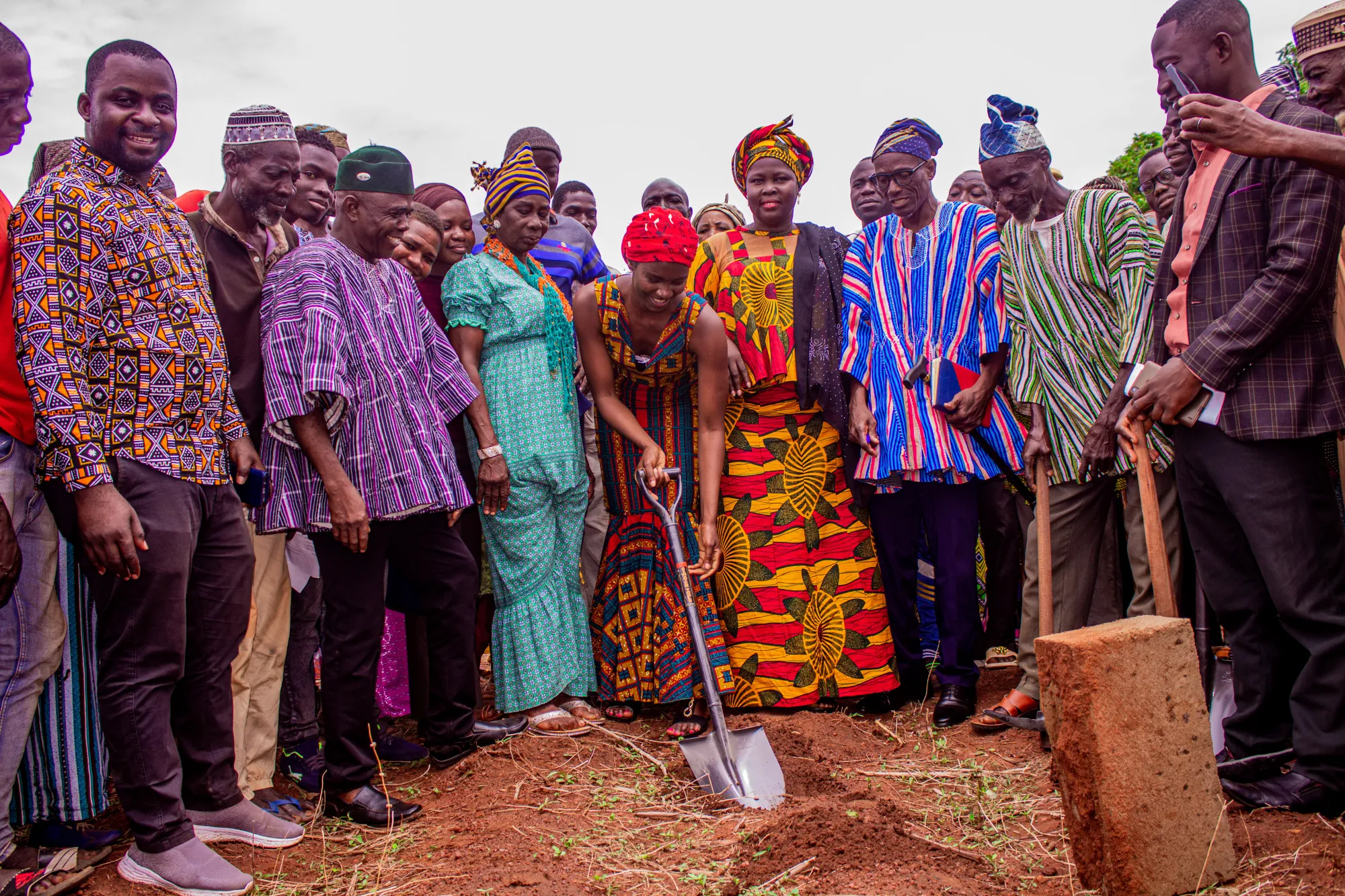
Construction of the new junior high school begins with a sod-cutting ceremony.
ABDULAI'S EDUCATIONAL PATH was anything but traditional. In 2009, she was part of the inaugural class of a new junior high school in Kolinvai, but it closed due to a lack of teachers. Despite her parents’ concerns that, at 15, she was too young to live away from home, she persuaded them to let her continue her education at the next closest school, about 7 miles away in the village of Nagboo. Before completing her second year there, she was raped and became pregnant—something she didn’t realize until her mother noticed changes in her daughter’s body. At 17, she gave birth to a baby girl she named Ilham. “I thought that was it,” Abdulai recalls. “I didn’t think I’d get to pursue my education or my goals and dreams anymore. I wanted to stay home and take care of my child.”
Tragically, Abdulai’s baby died that same year. Abdulai still does not know the cause. After grieving her loss, she decided it was time to return to school. She ran away from home to Tamale, northern Ghana’s capital city, where her sister Ramatu lived, and attended junior high school there. “I went to three schools before I could finish junior high,” she says. “I started at 14 years old and finished at age 19.”
Abdulai then moved to the city of Gambaga to attend boarding school. There, she met two Peace Corps volunteer teachers, Kiersten Miller and Amy Streets, who would set her on a new course. Miller remembers Abdulai as a “smart, kind, and ambitious” student who would go out of her way to help others. “One morning as I walked to class, my shoe broke,” Miller recalls. “Aminatu broke away from her group of friends to run back to the dorm to give me a pair of her own shoes for the day.”
Convinced of Abdulai’s potential, Miller and Streets helped her apply for a scholarship through an organization called Africa’s Tomorrow so she could attend college in the United States. She arrived in 2018 and began her studies at Montgomery College, a community college in Maryland. Her admission to Montgomery came with a bittersweet coda: Of the 12 girls in Kolinvai Junior High School’s 2009 inaugural class, only Abdulai made it to college.
At Montgomery, Abdulai marveled at simple things, like the fact that each science student had their own microscope. At her school in Ghana, an entire class would share a single microscope. Abdulai dove into her studies and excelled as an honors student. Her guidance counselor took note and suggested that Smith College would be the perfect match for her. After speaking to a Smith admission counselor, Abdulai felt an immediate connection, especially to the Ada Comstock Scholars Program for women of nontraditional college age.
Abdulai is committed to fixing the village’s dilapidated elementary school and eventually building a high school and college in Kolinvai—and beyond.
At 26, Abdulai came to Smith and eventually moved into Conway House, which provides living space for Adas and their families. “I got to have a comfortable apartment,” she recalls, “and I got to meet the very intelligent people at Smith that inspired me, boosted my confidence, and spoke to my heart to do more.”
Abdulai settled in quickly and began to make a name for herself on campus. By the time Asmae Lichir moved into Conway House a year later, Abdulai had already been appointed apartment manager by Smith’s Office of Residential Life. Lichir, a single mother originally from Morocco, bonded instantly with Abdulai—not because they were both from Africa but because of what Lichir calls Abdulai’s “beautiful vibrance” and “uncanny ability” to create community and make people feel at home. “Aminatu is a natural organizer and very giving to others,” Lichir says. “She united us at Conway House. She made sure that each of us came to gatherings, sat together, played games—she helped all of us to get stress out of our brain.”
A biological sciences major, Abdulai studied extensively under Steven Williams, the Gates Professor of Biological Sciences and an expert on neglected tropical diseases, which afflict the poorest billion people on the planet. Mary Doherty ’90, a research associate in Williams’ lab, was particularly impressed by Abdulai’s capacity for organization and bringing people together, making her an ideal lab leader. “When she started working here, she came to it fully—very professional, very organized, very serious about the work,” Doherty says. “She was a model for other students on how to problem-solve.”
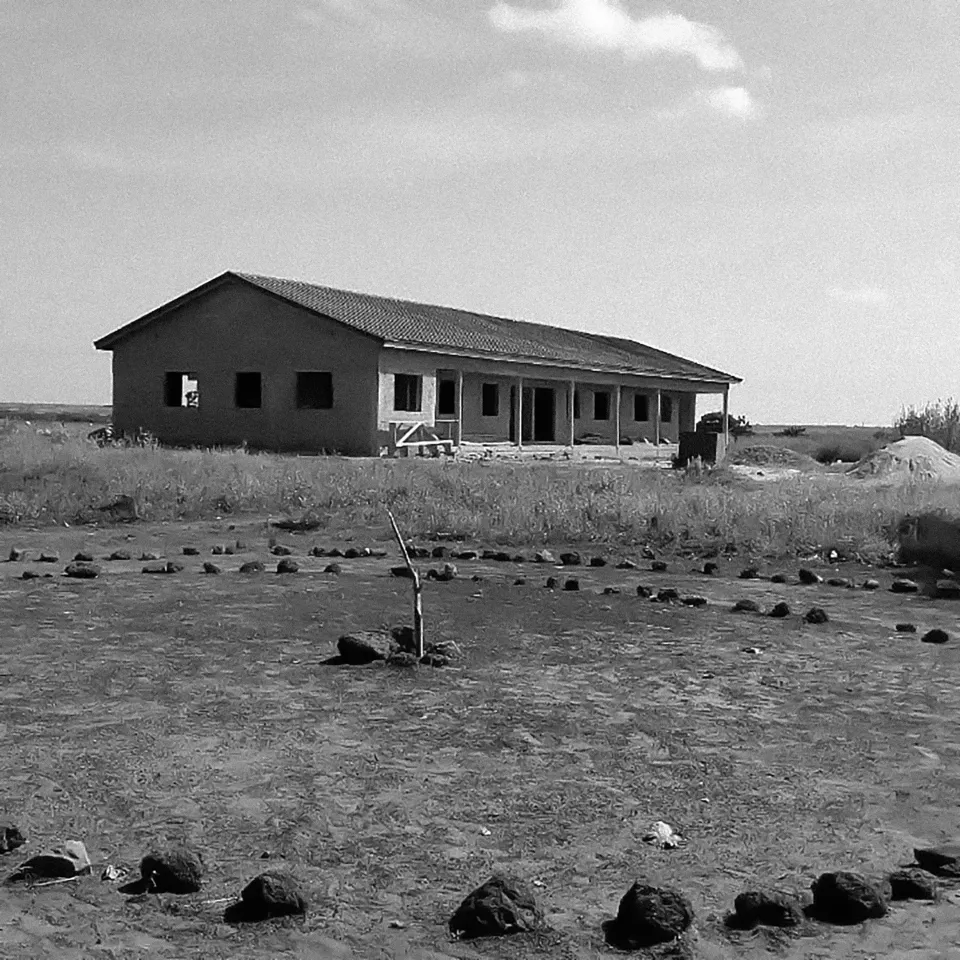
The new school takes shape. Next steps: plastering walls and installing doors and windows.
IN KOLINVAI, LAND ISN'T PURCHASED WITH MONEY. Rather, the local chief must approve its use. But, as Abdulai notes, there is nonetheless a price to pay. In building a new school, Abdulai has essentially taken a portion of land from local families who rely on it for their livelihoods. This weighs on her, but she knows that in the end the school will be good for everyone in the village. “The entire village is connected—like an extended family,” she says.
After graduating from Smith in 2023, Abdulai returned home to attend a sod-cutting ceremony—a Ghanaian tradition—to mark the beginning of the school’s construction. “By cutting the sod, we not only permit the workers to start their craft, but we also symbolize the collective approval and blessings of the chief and elders of the Kolinvai community—a prerequisite to any major community undertaking,” she says.
Before the ceremony, Abdulai held weekly planning meetings on Zoom with 15 volunteers from the United States and Ghana. They assembled a design and construction team that included student architect Kofi Nnamba, who offered to design the building. Abdulai’s brother Abuba managed the on-site work. “There’s a lot involved in a project like this,” Abdulai says. “My team members have played a crucial role in seeing this project to completion, from holding me accountable to executing some of the tasks needed, like fundraising, strategic planning, and helping on-site. I could not have done this without them.”
Eventually, Abdulai hopes to construct four buildings with space for classrooms, offices, a library, and a STEM lab. Fundraising for these efforts is ongoing. For now, though, the main building is already serving its purpose. In February, strong winds demolished the old junior high school structure in Kolinvai—but the new building, which was about 80% complete at the time, stood strong, making it possible for the village children to continue their studies. “If the new building wasn’t in place,” Abdulai says, “the kids would have dropped out of school indefinitely.”
Ask Abdulai what’s next for her and she’ll rattle off a long list of ambitious plans. First up is a graduate program in health care—an interest that was set in motion when, as a child, she watched her mother take medications for high blood pressure and other issues. “I wanted to know what these things were, what they were doing in her body,” Abdulai recalls. “Later, the loss of my child because of an unknown illness spiked my interest even more to pursue medicine.”
Elly Mons, director of health professions advising at the Lazarus Center for Career Development at Smith, has had regular check-ins with Abdulai over the past year and believes she has what it takes to succeed. “I see her empathy and compassion for others, and she is a model of resilience and adaptability—all crucial qualities for a health care provider to have, especially when faced with challenging patient cases or clinical environments,” Mons says.
Abdulai, who currently lives in Germantown, Maryland, and works as a medical assistant in a cardiologist’s office, intends to return to Ghana and work in health care, possibly specializing in cardiology or women’s health. She is also committed to growing the Kolinvai Youth Foundation, raising funds to fix the village’s dilapidated elementary school, and eventually building a high school and college in Kolinvai—and beyond. “We could replicate what we are doing in other communities,” she says.
The children of Kolinvai are what keep Abdulai motivated and inspired. She understands that what she has been able to accomplish in such a short time, and often under difficult circumstances, has made her a role model for a community of young people who have dreams as big as hers. She hopes that through her story the children of her village will see how education can lift them and take them to places they never thought possible.
“The main goal is to motivate them to stay in school,” Abdulai says. “If you don’t see a path to follow, a path that somebody has gone through, it’s difficult to understand, because nobody has done it before.”
Cheryl Dellecese is a senior editor at Smith.
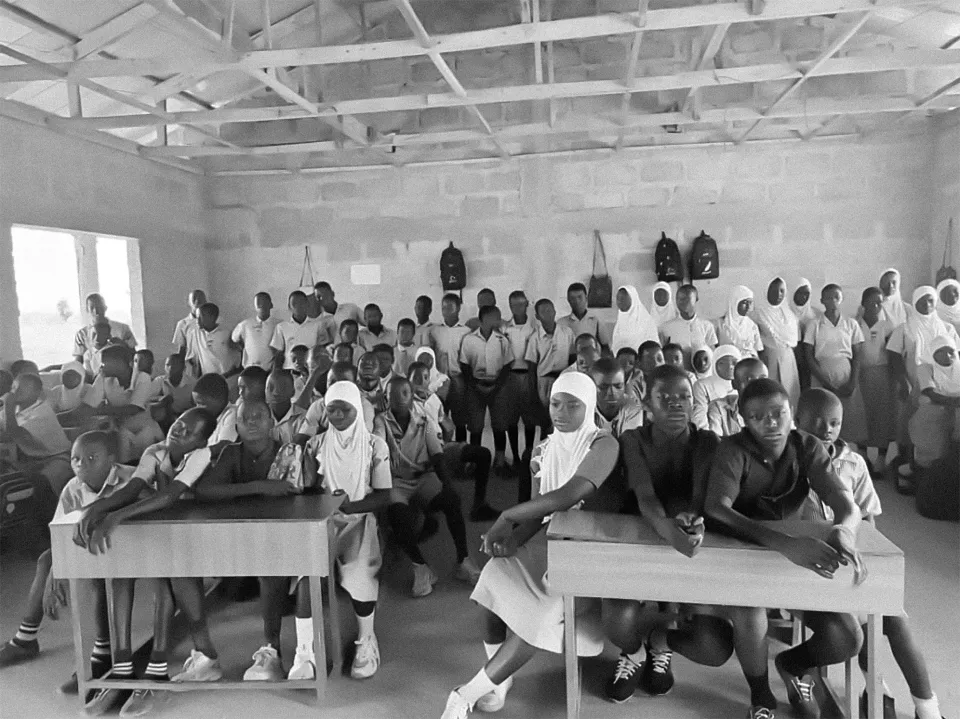
Village children assemble in the main building of the new school as it nears completion.
